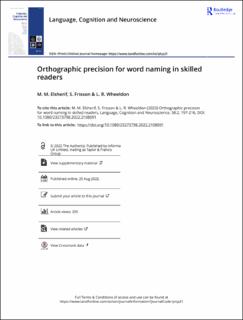| dc.contributor.author | Elsherif, M.M. | |
| dc.contributor.author | Frisson, S. | |
| dc.contributor.author | Wheeldon, Linda Ruth | |
| dc.date.accessioned | 2023-05-16T09:04:09Z | |
| dc.date.available | 2023-05-16T09:04:09Z | |
| dc.date.created | 2022-10-12T14:25:19Z | |
| dc.date.issued | 2022 | |
| dc.identifier.citation | Elsherif, M.M., Frisson, S. & Wheeldon, L. R. (2022). Orthographic precision for word naming in skilled readers. Language, Cognition and Neuroscience, 38(2), 197-216. doi: | en_US |
| dc.identifier.issn | 2327-3798 | |
| dc.identifier.uri | https://hdl.handle.net/11250/3068156 | |
| dc.description.abstract | Perfetti (2007) proposed that the quality of lexical representations affects reading. We investigated the role of lexical quality in decoding. Eighty-four adults read aloud words and pseudowords with dense and sparse neighbourhoods in a masked form-priming experiment. Individual-difference measures of language and cognitive processes were collected and entered into a principal component analysis (PCA). Compared to a non-overlapping control prime, we observed greater facilitatory form-priming for word targets with sparse neighbourhoods than those with dense neighbourhoods. A PCA component related to orthographic precision affected form-priming: people with low orthographic precision showed greater facilitation for words with sparse neighbourhoods, primed by pseudowords, than those with dense neighbourhoods. People with high orthographic precision demonstrated the converse, only when primed by words. For pseudoword reading, word primes facilitated more than pseudoword primes in people with low orthographic precision. People with high orthographic precision showed the opposite pattern. | en_US |
| dc.language.iso | eng | en_US |
| dc.publisher | Taylor & Francis | en_US |
| dc.rights | Attribution-NonCommercial-NoDerivatives 4.0 Internasjonal | * |
| dc.rights.uri | http://creativecommons.org/licenses/by-nc-nd/4.0/deed.no | * |
| dc.title | Orthographic precision for word naming in skilled readers | en_US |
| dc.type | Peer reviewed | en_US |
| dc.type | Journal article | en_US |
| dc.description.version | publishedVersion | en_US |
| dc.rights.holder | © 2022 The Author(s) | en_US |
| dc.subject.nsi | VDP::Samfunnsvitenskap: 200::Psykologi: 260 | en_US |
| dc.source.pagenumber | 197-216 | en_US |
| dc.source.volume | 38 | en_US |
| dc.source.journal | Language, Cognition and Neuroscience | en_US |
| dc.source.issue | 2 | en_US |
| dc.identifier.doi | 10.1080/23273798.2022.2108091 | |
| dc.identifier.cristin | 2060868 | |
| cristin.qualitycode | 1 | |

